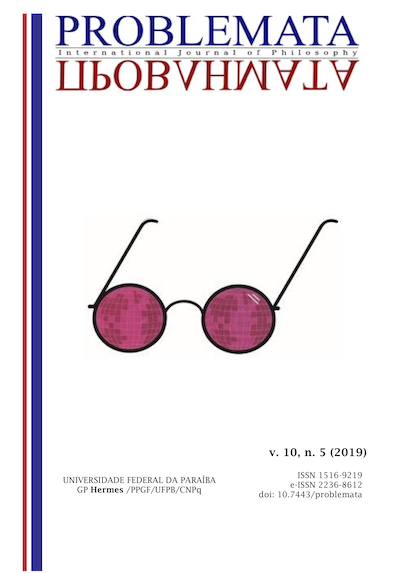EACHING WORK IN THE FIELD OF HUMAN SCIENCES:
PROSPECTS ON THE CONSTRUCTION OF THE CEARÁ STATE REFERENCE CURRICULAR DOCUMENT (DCRC) FOR THE COMMON CURRICULAR NATIONAL BASIS (BNCC)
DOI:
https://doi.org/10.7443/problemata.v10i5.49925Keywords:
Basic Education, Public Policy, BNCC, Curriculum, HumanitiesAbstract
This article aims to reflect on the presence and development of the text of the Humanities in the Ceará National Common Curriculum Base (BNCC), called the Ceará Referential Curriculum Document (DCRC). We sought to rescue its history, the construction and the way the implementation process is developing in Ceará. The steps that constitute the methodology are the bibliographic research, which had as its source official documents from the Ministry of Education and others produced in the State of Ceará, among which: Constitution (1988), LDB (1996), PCNEM (1999), PCN + (2002) and, more recently, DCNEM (2018), in addition to Escola Viva and Escola Aprendente, documents produced at the state level, respectively in 2005 and 2006. Other works analyzed were the books that helped to define the possible contents that will be present in the DCRC. Along with it, action research was also used as a methodological research strategy, since the participants are observers, but also agents of the process. The partial results come from the conclusions of the bibliographic reviews, which are present within the text of the DCRC, and led us to reflections and actions on curriculum and public policies for the production of BNCC in the state of Ceará, still under development.
Downloads
References
BRASIL. Ministério da Educação, Secretaria de Educação Básica. Base Nacional Curricular Comum. Brasília, 2018.
BRASIL. Ministério da Educação, Secretaria de Educação Básica. Guia PNLD. Brasília, 2019. Disponível em: https://www.fnde.gov.br/programas/programas-do-livro/consultas/editais-programas-livro/item/10521-pnld-2019. Acesso em: 30 ago. 2019.
BRASIL. Ministério da Educação, Secretaria de Educação Básica. Orientações Curriculares para o Ensino Médio: ciências humanas - volume 3. Brasília, 2006.
BRASIL. Ministério da Educação, Secretaria de Educação Básica. Diretrizes Curriculares Nacionais Gerais da Educação Básica. Brasília, 2013.
BRASIL. Ministério da Educação, Instituto Nacional de Estudos e Pesquisas Educacionais Anísio Teixeira. Plano Nacional de Educação: PNE 2014-2024. Brasília, 2015.
BRASIL. Lei nº 13.415, de 16 de fevereiro de 2017 – Estabelece a Lei do Novo Ensino Médio. Diário Oficial da União, Brasília, 17 fev, 2017.
BRASIL. Ministério da Educação, Secretaria de Educação Média e Tecnológica. Parâmetros Curriculares Nacionais para o Ensino Médio – Parte IV: Ciências Humanas e suas Tecnologias. Orientações Curriculares para o Ensino Médio: ciências humanas - volume 3. Brasília, 2000.
BRASIL. Lei nº 9.394, de 20 de dezembro de 1996. Estabelece as diretrizes e bases da educação nacional. Diário Oficial da União, Brasília, 23 dez, 1996.
BRASIL. Constituição da República Federativa do Brasil: promulgada em 5 de outubro de 1988. 4. ed. São Paulo: Saraiva, 1990.BRASIL.
BRASIL. Instituto Nacional de Estudos e Pesquisas Educacionais Anísio Teixeira. Censo Escolar 2018. Brasília, 2019.
CEARÁ. Secretaria da Educação. Metodologias de Apoio: áreas de ciências humanas e suas tecnologias. Fortaleza: SEDUC, 2008. (Coleção Escola Aprendente - Volume 4).
CEARA. Secretaria da Educação. Metodologias de Apoio: matrizes curriculares para ensino médio. – Fortaleza: SEDUC, 2009. (Coleção Escola Aprendente - Volume 1)
MACEDO, Elizabeth. “A base é a base”. E o currículo é o quê?. In. A BNCC na contramão do PNE 2014-2024: avaliação e perspectivas. Recife: ANPAE, 2018, p.28-33.
SILVA, Mônica Ribeiro. A BNCC da Reforma do Ensino Médio: o resgate de um empoeirado discurso. Educação em revista, V. 34, e214130, p. 1-15.
THIOLLENT, Michel. Metodologia da Pesquisa-ação. São Paulo: Editora Cortez, 1986.
ARANHA, Maria Lúcia de Arruda e MARTINS, Maria Helena Pires. Filosofando:
introdução à filosofia. São Paulo: Ed. Moderna, 2013.
GALLO, Sílvio. Filosofia: experiência do pensamento. São Paulo: Scipione, 2013.
CHAUÍ, Marilena. Iniciação à Filosofia. São Paulo: Ática, 2014.
COTRIM, Gilberto e FERNANDES, Mirna. Fundamentos de Filosofia. São Paulo: Saraiva, 2013.
MEIER, Celito. Filosofia: por uma inteligência da complexidade. Belo Horizonte: Pax, 2014.
Downloads
Published
Issue
Section
License
Authors who publish with this journal agree to the following terms:
- Authors retain copyright and grant the journal right of first publication with the work simultaneously licensed under a Creative Commons Attribution License that allows others to share the work with an acknowledgement of the work's authorship and initial publication in this journal.
- Authors are able to enter into separate, additional contractual arrangements for the non-exclusive distribution of the journal's published version of the work (e.g., post it to an institutional repository or publish it in a book), with an acknowledgement of its initial publication in this journal.
-
- Authors are permitted and encouraged to post their work online (e.g., in institutional repositories or on their website) prior to and during the submission process, as it can lead to productive exchanges, as well as earlier and greater citation of published work (See The Effect of Open Access).





